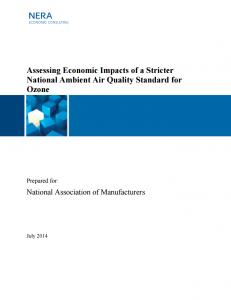Full Title: Assessing Economic Impacts of a Stricter National Ambient Air Quality Standard for Ozone
Author(s): Nera Economic Consulting
Publisher(s): Nera Economic Consulting
Publication Date: July 1, 2014
Full Text: Download Resource
Description (excerpt):
This report demonstrates analysis methods to assess the potential costs and impacts on the U.S. economy of a more stringent national ambient air quality standard (NAAQS) for ozone, and provides our estimates of the potential costs and economic impacts if the U.S. Environmental Protection Agency (EPA) were to set an ozone standard of 60 parts per billion (ppb). Our analysis is based on using the best available information on the emission reductions needed to attain a 60 ppb standard and the costs of those reductions; because that information is limited, we refer to our results as potential costs and economic impacts. Employing our integrated energy economic model (NewERA), we estimate that the potential emissions control costs would reduce U.S. Gross Domestic Product (GDP) by $270 billion per year on average over the period from 2017 through 2040 and by more than $3 trillion over that period in present value terms.1
The potential labor market impacts represent an average annual loss of 2.9 million job-equivalents.2 A tighter ozone standard may also result in barriers to new energy production activity in areas that become in nonattainment. We therefore also consider a sensitivity case that includes constraints on new natural gas production in the U.S., leading to even greater estimated impacts in terms of energy costs for consumers and losses in economic output. In this sensitivity case, we estimate a GDP reduction of $360 billion on average and more than $4 trillion over the period from 2017 through 2040 in present value terms, and a projected average annual loss of 4.3 million job-equivalents…
